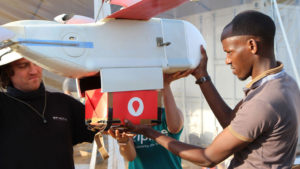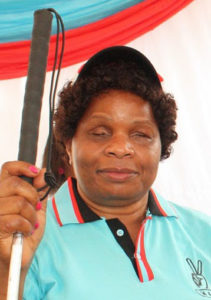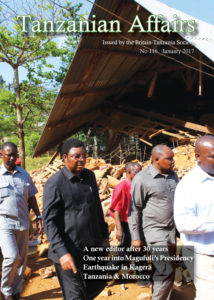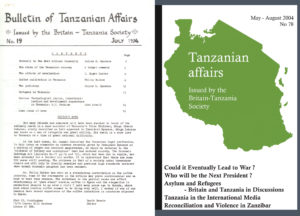by Martin Walsh
THE ART OF THE ZARAMO: IDENTITY, TRADITION, AND SOCIAL CHANGE IN TANZANIA. Fadhili Safieli Mshana. Mkuki na Nyota, Dar es Salaam, 2016. xiv + 190 pp. (paperback). ISBN 9789-9987-75-356-7. £28.00.
Mkuki na Nyota’s 2016 edition of The Art of the Zaramo: Identity, Tradition and Social Change is a well-produced (and more affordable) paperback edition of Fadhili Mshana’s doctoral dissertation, which he completed in 1999 with the original title Art and Identity among the Zaramo of Tanzania (State University of New York at Binghamton). Mshana is a professor of Art History at Georgia College and State Universty in Milledgeville, GA, in the USA. Although he completed his art historical education in Dar es Salaam, East Anglia and the US, Mshana started his career as a school teacher in Tanzania. Not only is he a visual art practitioner himself, he can also claim descent from a venerable blacksmithing lineage, so his identification with Tanzanian artistry runs deep and it is not surprising that his book is written in the voice of a culturally committed Tanzanian.
The Art of the Zaramo follows a standard dissertation format, with the first couple of chapters devoted to situating Zaramo wood carving practices within an historical and sociological framework. But the book also celebrates the resilience of these practices, and their responsiveness to new influences over time, within the rich cultural ‘mix’ of Dar es Salaam and of the wider Uzaramo area. At its core the book presents three themed essays on three respective forms in the Zaramo sculptural corpus. The first themed essay, on mwana hiti trunk figures, is presented in Chapter Four and deals with the way these remarkable, stylised, ritual artworks have retained their relevance as foci for female identification and articulation of female potency within the changing parameters of Zaramo female initiation rites. The second essay on figurative grave markers is covered in Chapter Five and discusses the role that widespread cultural change has had on memorial practices, focusing especially on the impact of the spatial and ideological upheaval instituted as part of the ‘villagisation’ programme which underpinned Tanzania’s post-Independence socialist policies. Mshana seems to suggest that the continuing survival and variety of figurative memorial sculptures in a context of spatial upheaval and, latterly, in contexts of proliferating cultural choices, is linked to the personalised forms of honouring ancestors and the continuing strength of family and ancestral ties. Chapter Six incorporates an engaging and enlightening discussion of Nyerere’s canny appropriation of the kifimbo (a short staff widely used by elders in many Tanzanian ethnic groups) to communicate and enhance his political authority.
But following this insightful discussion, Mshana’s cautious conclusion, with his predominantly object-focused approach, appears to leave more questions than answers on issues such as how individual Zaramo sculptors in Tanzanian contexts responded to new influences and experiences and how their artworks may accrue complex biographies and take on significances beyond the original contexts of their creation.
The Art of the Zaramo makes a welcome contribution to the field of East African art studies, but it can be over-cautious in places and sometimes seems averse to engaging in theoretically-informed interpretive analysis in favour of making ‘safe’ (p. 158) pronouncements that avoid, rather than engage with, complex realities. There is also relatively little in the way of direct Zaramo voices or voiced experiences in the book. Indeed ‘the Zaramo’ are referred to throughout as a homogenous block inhabiting an undifferentiated ‘Zaramo lived reality’
(p. 154). The author also defaults to other forms of generalisation at times and frequently seems to invest concepts of ‘modernity’ and ‘modernisation’ with active historical agency rather than human actors. Similarly, the author’s concepts of ‘tradition’ and ‘identity’ remain unspecified and un-problematised, which leaves them open to Frederick Cooper’s critique of being ‘putative’ and too ambiguous for rigorous analysis (Colonialism in Question, 2005, pp. 59-60). Finally, this reviewer cannot help noting that Mshana’s book perpetuates an old bias in African art studies in considering only the art of wood sculpture as a worthy object for study in a book about The Art of the Zaramo. Zaramo women’s ceramic arts are not considered in the book and other creative forms, like the commercialised blackwood genres, for example, are only briefly discussed.
Zachary Kingdon
Zachary Kingdon is Curator of the African Collections at National Museums Liverpool. He conducted his doctoral research among Makonde sculptors in Tanzania and holds a PhD in Advanced Studies in Non-Western Art from the University of East Anglia. He is the author of A Host of Devils: The History and Context of the Making of Makonde Spirit Sculpture (Routledge, 2002). He also coedited East African Contours: Reviewing Creativity and Visual Culture (HornimanMuseum, London, 2005).
FLYING SNAKES AND GREEN TURTLES: TANZANIA UP CLOSE. Evelyn Voigt. GSPH, Ottawa, ON, 2014. xii + 410 pp. (paperback). ISBN 978-1-77123-055-1. $30 Canadian, plus shipping and handling (to order copies please contact Gordon Breedyk, breedyk14@yahoo.ca)
I’ll admit that when this 400-page tome landed through my letterbox, I had doubts. Biographies can go so wrong, and was the Fox story genuinely print-worthy?
As it turns out, it’s a real page-turner. Anyone who has spent time in Iringa will probably know of the Fox family and their thriving safari enterprises. If you have, you will marvel at their full life story. Even if you haven’t, this book is a fascinating window into pre-independence Tanganyika and the pioneering spirit of (exceptional) expats of the time. Accompanying the narrative are relevant text boxes with historical summaries (think Lonely Planet, but better). This worked really well, and I was grateful to finally know about Mkwawa and other parts of Tanzanian history that I should have read about years ago, presented in a personal and interesting way.
The book tells of Geoff and Vicky Fox’s incredible adventures in Tanzania from the late 1950s to the present day. Geoff arrives in Tanzania as an eager Brooke Bond bachelor and throws himself into tea plantation work and Mufindi social life. Vicky joins him, and they enjoy regular walking safaris around Mufindi and into Ruaha, which they continue even as they bring up their four children. The book is rich in anecdotes that make even the most adventurous parent look risk-averse. Baby Bruce bouncing out of the car boot on their road trip to South Africa, to be retrieved only when a passing car alerted them… their children diving into crocodile-infested waters to retrieve valuable fishing hooks, the thousand-bee attack, pregnant Vicky floating down the Ruaha river on logs back to their camp… and many more. Life must have been tough, but the Foxes’ quirky humour and Evelyn Voigt’s wonderful retelling of their escapades evoke idyllic family life with the children learning freedom, independence and appreciation of nature in the Tanzanian bush. I felt nostalgic for a life that was never mine.
The book will leave you full of admiration for the Fox family’s ingenuity and resourcefulness. Of course, this is Tanzania Up Close from a distinctly expatriate perspective. But there is no doubt that Geoff and Vicky, and subsequently their sons and daughters-in-law, have made a tremendous contribution to Tanzania, investing in its economy, creating significant employment, and succeeding in protecting precious wildlife, forests and reefs in the face of formidable challenges. I found myself getting nervous as their community development work approached in the story, especially with the mention of an orphanage. But their work was appropriate, very integrated with the local community, and seemed to be making a profound and sustainable impact.
It feels mean to critique this generous, heart-warming love story – any criticisms are minor. The slightly dated front cover is a bit off-putting. I wasn’t convinced by the poems (the narrative was richly descriptive enough as it was) and there was repetition that could have been better edited. However, overall, this was a great read and is highly recommended.
Naomi Rouse
Naomi Rouse has worked in education in Tanzania since 1998, initially in HIV/AIDS prevention, and then specialising in girls’ education. She advises NGOs and major agencies on girls’ education programming and Monitoring and Evaluation, as well as directly managing a pilot of digital learning in rural secondary schools in Iringa for Lyra (www.lyrainafrica.org).
TIME PAST IN AFRICA: MERVYN SMITHYMAN AND FAMILY RECOLLECTIONS. Anne M. Chappel. CreateSpace, 2015. 222 pp. (paperback). ISBN 978-1517172275. £7.85.
ZANZIBAR UHURU: A REVOLUTION, TWO WOMEN AND THE CHALLENGE OF SURVIVAL. Anne M. Chappel. CreateSpace, 2015. vi + 314 pp. (paperback). ISBN 978-1505511840. £10.00.
Anne Chappel, the author of these two self-published books, is the daughter of Mervyn Vice Smithyman (1911-2008), best known to historians for the way in which his all-too-brief tenure as a Permanent Secretary came to an abrupt end on the day of the Zanzibar Revolution, when he was forced to flee by swimming out to a boat in the harbour. In their very different ways, both of these books, one a memoir and the other a historical novel, help put that unforgettable incident into proper perspective, not least by providing the personal details and context, real and imagined, that are absent in the cursory published accounts. For Mervyn Smithyman was not alone that day, but before making his own escape, made sure that his family and others were safe offshore, among them the 16-year-old Anne. These complementary works of fact and fiction can be read as her own reckoning with the past and the shocking events of that day. The first embeds it in family history; the second is a sensitive reflection on its consequences for the lives of others, including those less fortunate than herself.
As a memoir, the richly-illustrated Time Past in Africa is also much more than this. Its first half traces Mervyn’s family roots and early life in South Africa, where he was born, and Nyasaland, where he spent the second half of his childhood. His parents, Fred Milner and Catherine Jessie Smithyman (neé Vice) worked their way up in colonial society from relatively inauspicious beginnings; the last of their ten children was born in 1933 and by the start of the Second World War they owned both a large family house with stables and a separate holiday home, and were running a hotel, a mineral water factory, and a brewery in Zomba. Mervyn had a job as a junior clerk in the Department of Agriculture, and repaired typewriters for the government in his spare time, work which gave him the time and means to travel around the world in the year before the outbreak of conflict. During the War itself he served as an officer in the King’s African Rifles, rising to command a battalion in India, and this experience stood him in good stead when he applied to join the British Colonial Administration.
The second half of the memoir details his subsequent career in Tanganyika and Zanzibar. His first posting was as Assistant District Officer in Mwanza; he went there in 1947 with his wife Audrey and son Michael, and they were soon joined by baby Anne. He was then posted to Bukoba and soon after to Biharamulo, where he was District Commissioner. In 1949 he was transferred to Same in Pare District, and stayed there until moving to the Secretariat in Dar es Salaam in 1953, where he worked in the District Administration Department and got to know the Governor, Sir Edward Twining. In 1955 he was appointed Senior District Officer in Mbeya, and that was his last tour on the mainland before being offered the post of Senior Assistant Commissioner in Zanzibar, a job he began in September 1956 by serving for six months as District Commissioner of Pemba, based in Wete. In early 1957 he moved to Zanzibar town, and began the period of his career that has attracted most scrutiny by researchers, coinciding as it did with the zama za siasa, the ‘time of politics’ and series of hotly contested elections that preceded Zanzibar’s Independence in December 1963. Smithyman agreed to stay on for a time as Permanent Secretary under the new Prime Minister, Mohammed Shamte. But, as we now know, this lasted for little more than a month.
The most gripping parts of this memoir are his and other family members’ recollections of what happened on that fateful day. They differ somewhat from previously published accounts, and add new details, for example about the disagreements between different expats and members of the government over how they should respond to the rapidly evolving crisis on the morning of 12 January 1964.
The novel, Zanzibar Uhuru, takes off from a fictionalised version of the same events. Like the memoir, it is written in different narrative voices. The first section, which focuses on the first weeks of the Revolution, even includes a few harangues and mad rambles in the hectoring and self-justifying tones that were typical of the speeches and writings of the self-styled Field Marshal John Okello. But the real stars of the story are two women who relate their struggles with the myriad consequences of the events that Okello set in train. The suffering of the first of these, a Zanzibari Arab orphaned during the Revolution, is very persuasively told in the middle section of the book, and carries the tale. The third and final section takes us back to the life of the daughter of a British official whose flight from Zanzibar recalls that of the real-life Smithyman, and brings us forward to the present, when the lives of the two women become intertwined again. Like all good historical novels, Zanzibar Uhuru leaves you wanting to know more about the events it is based on, and which of them might be true. It has been carefully researched, and includes references and a list of further reading for good measure. I only noticed a few minor slips.
Zanzibar Uhuru is boldly conceived and compellingly written. Critics aware of Time Past in Africa and the author’s background will accuse her of reproducing the worldview and political prejudices of her own family and class. But as a survivor of the Zanzibar Revolution herself, she has every right to tell and re-imagine her tale. Although more than half a century has now passed since the Revolution, the wounds it opened are still raw, especially for the women who live with painful memories of the brutality they and their loved ones suffered when their worlds were turned upside-down. Anne Chappel is to be congratulated for bringing part of that story to us, and I hope it will encourage others to do the same, in whatever narrative or creative form.
Martin Walsh





